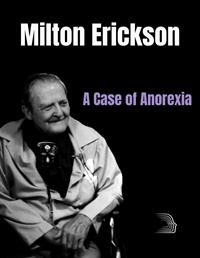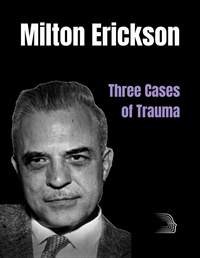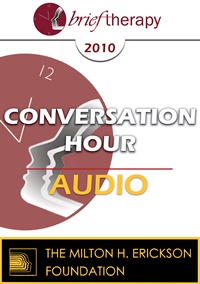
- Average Rating:
- Not yet rated
- Topic Areas:
- Conversation Hours | Virginia Satir | Milton Erickson
- Categories:
- Brief Therapy Conference | Brief Therapy Conference 2010
- Faculty:
- Jeffrey Zeig, PhD
- Duration:
- 1:00:56
- Format:
- Audio Only
- Original Program Date:
- Dec 11, 2010
- Short Description:
- BT10 Conversation Hour 11 - Personal Reflections on the Masters: Erickson, Frankl, Whitaker, Rogers & Satir - Jeffrey Zeig, PhD Personal Reflections on the Masters: Erickson, Frankl, Whitaker, Rogers & Satir with Jeff Zeig
- Price:
- $15.00 - Base Price
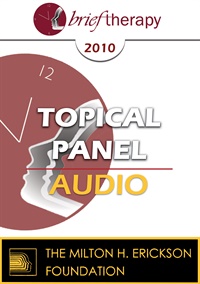
- Average Rating:
- Not yet rated
- Topic Areas:
- Milton Erickson | Topical Panels
- Categories:
- Brief Therapy Conference | Brief Therapy Conference 2010
- Faculty:
- Steve Andreas, MA, NLP | Stephen Gilligan, PhD | Bill O'Hanlon, MS | Jeffrey Zeig, PhD
- Duration:
- 58:29
- Format:
- Audio Only
- Original Program Date:
- Dec 11, 2010
- Short Description:
- BT10 Topical Panel 07 - About Milton Erickson - Steve Andreas, MA, Stephen Gilligan, PhD, Bill O’Hanlon, MS, Jeffrey Zeig, PhD
- Price:
- $15.00 - Base Price
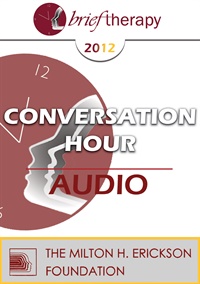
- Average Rating:
- Not yet rated
- Topic Areas:
- Conversation Hours | Milton Erickson
- Categories:
- Brief Therapy Conference | Brief Therapy Conference 2012
- Faculty:
- Roxanna Erickson Klein, RN, PhD, LPC, LCDC
- Duration:
- 1:04:56
- Format:
- Audio Only
- Original Program Date:
- Dec 07, 2012
- Short Description:
- BT12 Conversation Hour 12 – The Home Life of Milton Erickson – Roxanna Erickson-Klein, PhD Educational Objectives: Learn the philosophies of various practitioners and theorists.
- Price:
- $15.00 - Base Price
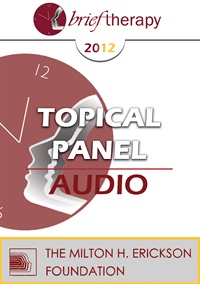
- Average Rating:
- Not yet rated
- Topic Areas:
- Milton Erickson | Topical Panels
- Categories:
- Brief Therapy Conference | Brief Therapy Conference 2012
- Faculty:
- Steve Andreas, MA, NLP | Robert Dilts, BA | Bill O'Hanlon, MS | Roxanna Erickson Klein, RN, PhD, LPC, LCDC
- Duration:
- 1:01:54
- Format:
- Audio Only
- Original Program Date:
- Dec 07, 2012
- Short Description:
- BT12 Topical Panel 02 – About Milton Erickson - Steve Andreas, MA, Robert Dilts, Bill O’Hanlon, MS, Roxanna Erickson-Klein, PhD
- Price:
- $15.00 - Base Price
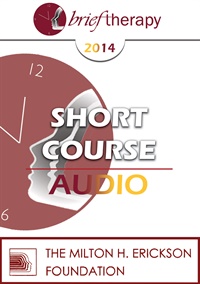
- Average Rating:
- Not yet rated
- Topic Areas:
- Anxiety | Depression | Trauma | Short Courses | Milton Erickson | Brief Therapy
- Categories:
- Brief Therapy Conference | Brief Therapy Conference 2014
- Faculty:
- Dale Bertram, PhD | Mike Rankin, MA
- Duration:
- 1:33:32
- Format:
- Audio Only
- Original Program Date:
- Dec 11, 2014
- Short Description:
- This workshop focuses on the nuts and bolts of providing online Ericksonian Clinical Supervision. It will address how to select an online platform, the major legal and ethical issues in providing online supervision, and a focused discussion on how to utilize the online environment to provide quality supervision. Participants will leave this workshop with a good overview about how to conduct digital (online) supervision in ethical and useful ways.
- Price:
- $15.00 - Base Price
Tags: Anxiety Depression Trauma Brief Therapy
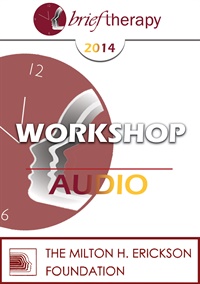
- Average Rating:
- Not yet rated
- Topic Areas:
- Anxiety | Depression | Trauma | Cognitive Behavior Therapy (CBT) | Hypnosis | Workshops | Ericksonian Hypnosis and Therapy Techniques | Milton Erickson | Brief Therapy | Naturalistic
- Categories:
- Brief Therapy Conference | Brief Therapy Conference 2014
- Faculty:
- Ernest Rossi, PhD | Kathryn Rossi, PhD | Roxanna Erickson Klein, RN, PhD, LPC, LCDC
- Duration:
- 1:59:16
- Format:
- Audio Only
- Original Program Date:
- Dec 12, 2014
- Short Description:
- Ernest Rossi, PhD, Roxanna Erickson-Klein and Kathryn Rossi review the case work of Milton H. Erickson, MD in counseling, psychotherapy, therapeutic hypnosis and rehabilitation as evidence-based cognitive behavior therapy to treat anxiety, depression and trauma. This experiential workshop explores the timeless nature of the work of Milton H. Erickson, who substantially influenced the manner that psychotherapy is practiced in the 21 century.
- Price:
- $15.00 - Base Price
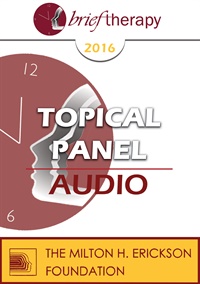
- Average Rating:
- Not yet rated
- Topic Areas:
- Milton Erickson | Topical Panels
- Categories:
- Brief Therapy Conference | Brief Therapy Conference 2016
- Faculty:
- Stephen Gilligan, PhD | A. Steven Frankel, PhD, JD, ABPP | Bill O'Hanlon, MS | Jeffrey Zeig, PhD
- Duration:
- 1:00:05
- Format:
- Audio Only
- Original Program Date:
- Dec 10, 2016
- Short Description:
- BT16 Topical Panel 6 - About Milton H. Erickson - Stephen Gilligan, Steve Frankel, Bill O’Hanlon, and Jeffrey Zeig Topical Panel About Milton H. Erickson
- Price:
- $15.00 - Base Price
Tags: Milton Erickson
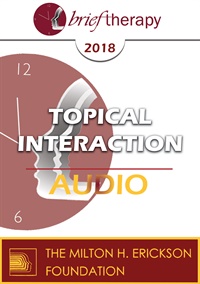
- Average Rating:
- Not yet rated
- Topic Areas:
- Topical Interactions | Brief Therapy | Milton Erickson
- Categories:
- Brief Therapy Conference | Brief Therapy Conference 2018
- Faculty:
- Jeffrey Zeig, PhD
- Duration:
- 57:25
- Format:
- Audio Only
- Original Program Date:
- Dec 08, 2018
- Short Description:
- Describe and exemplify essentials of Milton Erickson's approach to Brief Therapy.
- Price:
- $15.00 - Base Price
Credit available - Click Here for more information
- Average Rating:
- Not yet rated
- Topic Areas:
- Anorexia | Eating Disorders | Milton Erickson | Ericksonian Hypnosis and Therapy Techniques | Utilization | Hypnosis
- Categories:
- Erickson Materials | Erickson Streaming Video Collection | Milton H. Erickson Collections | Online Continuing Education
- Faculty:
- Milton H. Erickson, MD | Jeffrey Zeig, PhD
- Course Levels:
- Master Degree or Higher in Health-Related Field
- Duration:
- 1 hour
- Format:
- Audio and Video
- Original Program Date:
- Apr 27, 2020
- Short Description:
- In this video, you will see Erickson’s unusual way of treating anorexia. Erickson described himself as a person who has an iron fist, but a velvet glove. He knew when it was right to be firm, to be disciplined, and even to be assertive in work with a client. Dr. Jeffrey Zeig provides insightful commentary on this historic Erickson clip.
- Price:
- $29.95 - Base Price
Credit available - Click Here for more information
- Average Rating:
- Not yet rated
- Topic Areas:
- Trauma | Ericksonian Hypnosis and Therapy Techniques | Milton Erickson | Storytelling | Hypnosis
- Categories:
- Lounsbury Winston Donation | Erickson Materials | Milton H. Erickson Collections | Erickson Streaming Video Collection | Online Continuing Education
- Faculty:
- Milton H. Erickson, MD | Jeffrey Zeig, PhD
- Course Levels:
- Master Degree or Higher in Health-Related Field
- Duration:
- 1 hour
- Format:
- Audio and Video
- Original Program Date:
- Dec 31, 1972
- Short Description:
- For this one-hour video, we reached backed into the Erickson archives, circa 1973 to 1978, to Milton Erickson’s teaching seminars. Erickson conducted these teaching seminars in the comfort and intimacy of his own home. In this video, we encounter three cases – each dealing primarily with trauma. And in each of these cases, there is hidden meaning. Erickson demonstrates how to take “extraneous” information provided by the client, understand the context relevant to the client’s problem, and insightfully extrapolate the true meaning for therapeutic effect.
- Price:
- $19.95 - Base Price
Please wait ...


